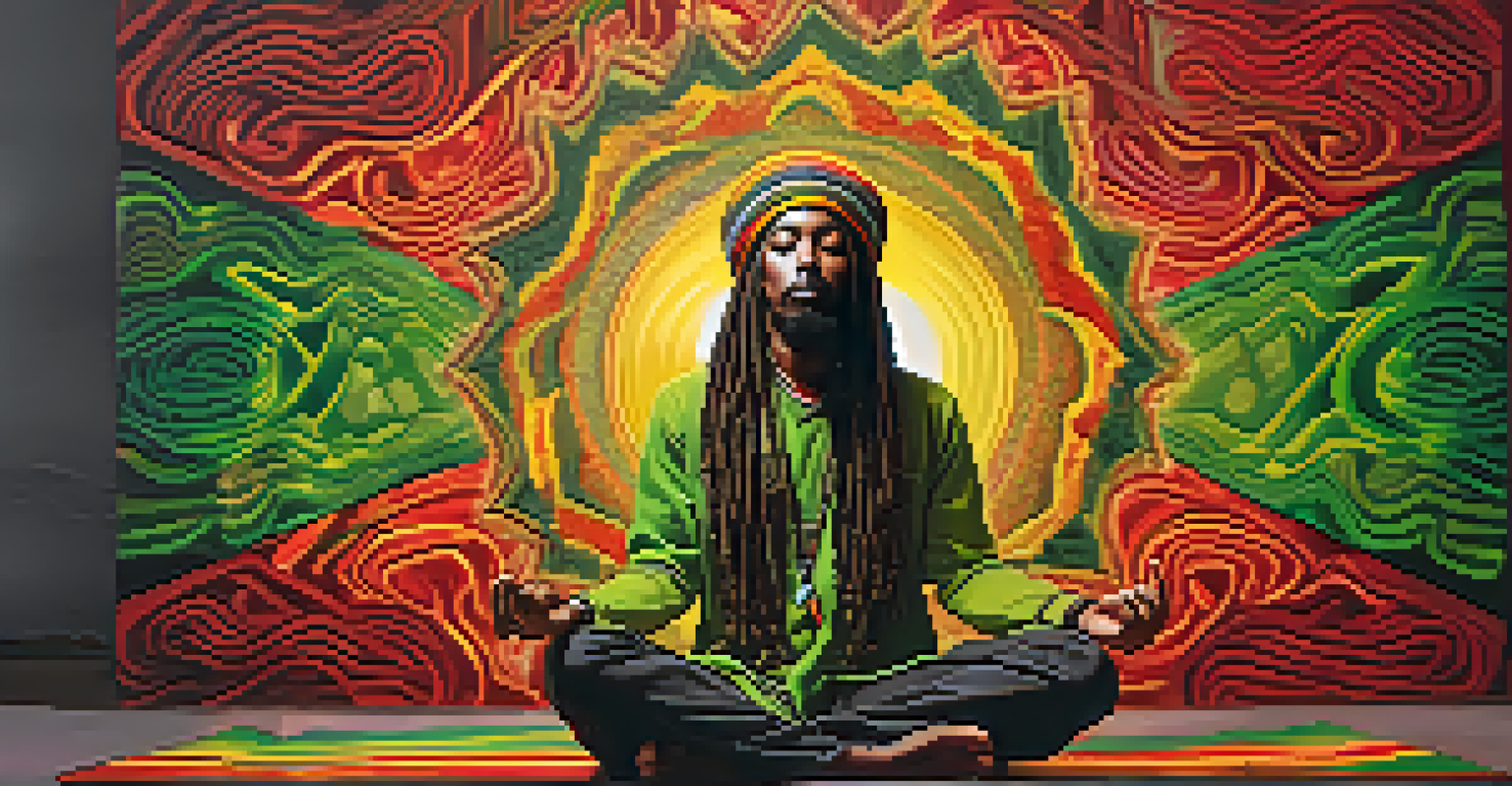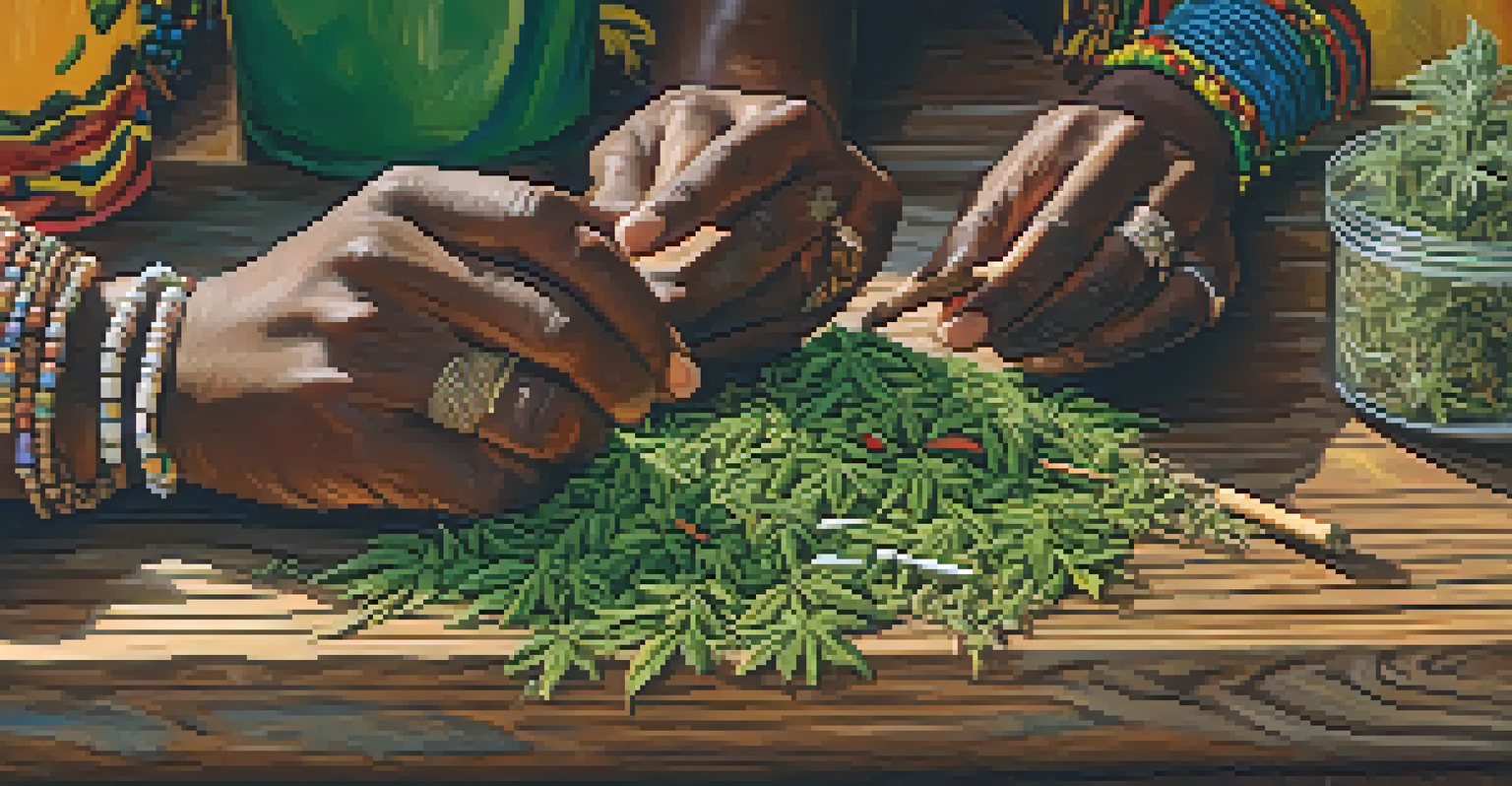The Role of Rasta Culture in Marijuana's Popular Image

Understanding Rasta Culture and Its Origins
Rasta culture, with its roots in Jamaican history, emerged as a spiritual movement in the 1930s. It draws heavily from African heritage, emphasizing themes of resistance and liberation. Central to this culture is the belief in the divinity of Emperor Haile Selassie I of Ethiopia, which shapes many of its practices and beliefs.
Marijuana is a sacred herb that has the potential to enhance spiritual practices and foster a deeper connection with the divine.
The movement promotes a lifestyle that values community, equality, and the celebration of life. Music, particularly reggae, plays a significant role in expressing Rasta beliefs and connecting with broader audiences. This cultural framework sets the stage for understanding how Rasta influences perceptions of marijuana.
For Rastas, marijuana, or 'ganja,' is not merely a recreational substance but a sacred herb. It is believed to enhance spiritual practices, facilitate meditation, and foster a deeper connection with the divine. This spiritual significance contributes to its association with Rasta culture.
Marijuana as a Symbol of Rasta Identity
Within Rasta culture, marijuana has become a powerful symbol of identity and resistance. It represents a rejection of societal norms and an embrace of alternative lifestyles. The use of ganja is often seen as a means of reclaiming autonomy in a world that has historically marginalized Black voices.

Many Rasta communities view marijuana as a natural remedy, aligning with their holistic approach to health and wellness. This perspective contrasts sharply with mainstream perceptions that often frame marijuana solely as a drug for recreation or abuse. The Rasta narrative adds depth, showcasing the plant's multifaceted role.
Rasta Culture Values Spirituality
Rasta culture emphasizes the spiritual significance of marijuana, viewing it as a sacred herb that enhances meditation and connection with the divine.
The visibility of Rasta figures, such as Bob Marley, has further cemented marijuana's association with the culture. Through music and activism, these figures have popularized the message of ganja as a tool for spiritual awakening and social justice, influencing perceptions worldwide.
Cultural Appropriation and Misrepresentation
As marijuana gained popularity globally, aspects of Rasta culture have often been appropriated without understanding their significance. Many people view ganja simply as a recreational substance, overlooking its spiritual and cultural roots within Rasta traditions. This misrepresentation can dilute the rich history and beliefs tied to the herb.
The power of reggae music lies in its ability to communicate messages of freedom, resistance, and the spiritual significance of ganja.
Rastas have voiced concerns about the commercialization of marijuana, which can exploit their cultural symbols while disregarding their context. As cannabis products flood the market, the original meaning attached to ganja is sometimes lost, leading to a disconnect between the culture and its representation.
This appropriation underscores the importance of educating the public about Rasta culture and its views on marijuana. By fostering awareness, we can better appreciate the depth of the connection between Rasta identity and ganja, encouraging respectful engagement with the culture.
Reggae Music's Role in Promoting Rasta and Marijuana
Reggae music is inextricably linked to Rasta culture and has played a significant role in promoting the relationship between marijuana and spirituality. Artists like Bob Marley have infused their music with messages about ganja, using it as a metaphor for freedom and resistance. This powerful medium has helped to disseminate Rasta beliefs to a global audience.
Through their lyrics, reggae musicians often highlight the benefits of marijuana, portraying it as a source of inspiration and enlightenment. The rhythmic beats and soulful melodies resonate with listeners, making the messages even more impactful. This connection between music and culture has helped to normalize the use of ganja within the context of Rasta traditions.
Marijuana Symbolizes Resistance
Within Rasta culture, marijuana represents a rejection of societal norms and an embrace of identity, reflecting the community's historical struggles.
As reggae continues to evolve, it remains a vital platform for discussing issues surrounding marijuana use, legalization, and social justice. The genre’s ongoing influence ensures that the conversation around ganja and Rasta culture remains relevant and engaging.
The Intersection of Spirituality and Cannabis Use
For many Rastas, smoking marijuana is a ritualistic practice that facilitates spiritual connection. The act of lighting a joint is often accompanied by prayers or chants, transforming it into a sacred experience. This spiritual use contrasts sharply with how marijuana is often perceived in mainstream culture, where it’s typically associated with partying or escapism.
The meditative aspects of ganja consumption are emphasized within Rasta communities. Users believe that ganja enhances their ability to connect with their inner selves and the divine. This spiritual dimension invites individuals to explore their consciousness and develop a deeper understanding of life's mysteries.
By framing marijuana use as a spiritual practice, Rasta culture invites broader conversations about the potential benefits of cannabis beyond recreational use. This perspective can help shift societal views, encouraging a more holistic understanding of the plant's role in personal and communal well-being.
Marijuana Legalization and Rasta Perspectives
As cannabis legalization sweeps across various regions, Rasta communities have mixed feelings about this development. While many celebrate the decriminalization of ganja, they also express concern over who benefits from legalization. Historically, Rastas have faced criminalization for their use of marijuana, and there's a fear that commercialization may overshadow their cultural significance.
The push for legalization often raises questions about equity and access within the cannabis industry. Rasta advocates stress the need for inclusivity, ensuring that those who have been marginalized in the past are not left behind as the industry grows. This conversation highlights the importance of addressing historical injustices while moving toward a more equitable future.
Cultural Appropriation Concerns
The commercialization of marijuana often overlooks its rich cultural roots within Rasta traditions, raising concerns about misrepresentation and exploitation.
Ultimately, the Rasta perspective on marijuana legalization calls for a balance between celebration of the herb's cultural roots and the need for responsible, ethical practices in its commercialization. This nuanced view emphasizes the importance of preserving the identity and values embedded in Rasta culture.
The Future of Rasta Culture and Marijuana's Image
As society continues to evolve, the relationship between Rasta culture and marijuana will undoubtedly adapt. The growing acceptance of cannabis presents opportunities for Rastas to educate others about their beliefs and practices. By sharing their stories and experiences, they can foster a deeper understanding of the cultural significance of ganja.
Social media and digital platforms are powerful tools for amplifying Rasta narratives. They allow individuals to connect, share resources, and advocate for the preservation of cultural traditions. As more people engage with Rasta culture online, the potential for greater appreciation and respect for its connection to marijuana increases.

Looking ahead, it's essential to balance the celebration of marijuana's popular image with a commitment to honoring its roots in Rasta culture. By fostering dialogue and understanding, we can create a more inclusive narrative that respects the complexities of cannabis use and its cultural significance.